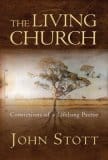The Living Church


“I began this book with a preface which acknowledged that many people today are looking for a ‘fresh expression’ of the church,” writes evangelical statesman John Stott. “My concern has been that in this legitimate process of exploration they will not forget, let alone abandon, certain biblical and history-proven marks of a living church.”
John Stott, now in his eighties, has had a worldwide influence on evangelicalism through his writing and ministry at All Souls Church, Langham Place. Time magazine has recognized him as one of the “100 Most Influential People in the World.” He has had a massive impact on evangelicalism. When I heard that Stott had recently written a book articulating his vision for the global church today, I knew I would have to read it.
Stott is no curmudgeon. He is surprisingly open to newer forms of churches. “It seems to me that traditional and ’emerging’ churches need to listen attentively to one another, with a view to learning from one another…We could both afford to be less suspicious, less dismissive of each other.”
Stott argues that we need more churches that are radically conservative – “conservative” in the sense that they conserve what Scripture plainly requires, but “radical in relational to that combination of tradition and convention which we call culture.” He then outlines a number of characteristics that must be preserved within an authentic or living church.
The first of these characteristics is worship, which he calls “the church’s preeminent duty.” The glory of God drives the second characteristic of church: evangelism. Of all the forms of evangelism, local church evangelism is “the most normal, natural and productive method of spreading the gospel today.” In order to be effective in its evangelism, the church must understand its double identity as people who are both called out of the world to worship God, and sent back into the world to witness and serve. It must also structure itself for evangelism, articulate the gospel in a way that is both faithful and relevant, and live as “God’s new society, the living embodiment of the gospel, a sign of the kingdom of God, a demonstration of what human community looks like when it comes under his gracious rule.”
Churches must also be characterized by every-member ministry. God calls all of his people to ministry. Churches must recognize that God calls people to different ministries, and allow pastors to be set free from unnecessary administration so the church can flourish.
Stott expounds fellowship, the next characteristic of church. Churches must divide into smaller groups or mini-churches to facilitate ministry to one another.
Churches must also be characterized by preaching, despite the contemporary world’s unfriendly attitudes. “My task in this chapter…is to try to persuade preachers to persevere, because the life of the church depends on it…Churches live, grow, and flourish by God’s word, but they languish and perish without it.” Preaching must balance several tensions: it must be biblical and contemporary, authoritative and tentative, prophetic and pastoral, gifted and studied, and thoughtful and passionate.
Churches must also be giving and must have impact on society, working toward social improvement.
Stott concludes with an appeal for Timothy’s in this new century. Echoing the apostle Paul, he writes: “There is such a thing as goodness: pursue it…There is such a thing as truth: fight for it. And there is such a thing as life: lay hold of it.” Ministry must integrate doctrine, ethics, and experience.
The Living Church includes three appendices: a paper outlining Stott’s reason for remaining within the Church of England; part of a sermon from 1974 outlining his dreams for a living church; and some reflections offered after his eightieth birthday.
The Living Church is not trendy. There is little in this book that will seem new. It is instead a call to the basics, offered with pastoral insight and wisdom. It is a call to turn away from quick fixes and instead focus on the basics of church life. It deserves careful reading and application by all who share Stott’s dream of a living church.
More from Amazon.com | Amazon.ca





